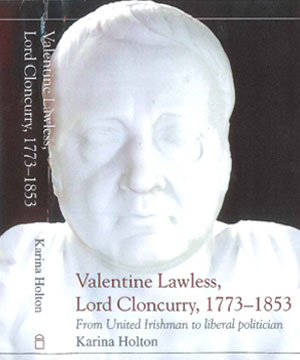Valentine Lawless, Lord Cloncurry, 1773–1853: from United Irishman to Liberal politician
Published in Book Reviews, Issue 1 (January/February 2019), Reviews, Volume 27KARINA HOLTON
Four Courts Press
€49
ISBN 9781846827051
Reviewed by: Sylvie Kleinman
 Sylvie Kleinman has worked for the Dictionary of Irish Biography.
Sylvie Kleinman has worked for the Dictionary of Irish Biography.
This book makes the compelling case that Valentine Lawless, second Baron Cloncurry, was ‘second only to the [3rd] Duke of Leinster’ among high-ranking Liberal Protestants during the first half of the nineteenth century. Ever ‘influenced by justice and patriotism’, his restless energy may well have made him the most prominent agitator for Ireland after Daniel O’Connell in the early 1800s, yet he virtually disappeared from Irish history. Cloncurry’s multiple endeavours encompassed reform of the legal system, universal education and employment, durable economic improvement and, in old age, the relief of suffering and distress during the Famine; he was relentlessly driven by the conviction that only repeal of the Union could bring about greater justice for Ireland. Championing Catholic Emancipation from as early as 1811, he later urged O’Connell to prioritise Repeal. Not wishing to compromise his friendship with Lord Anglesey, a viceroy he had befriended who could do good for Ireland, Cloncurry was steadfast about not aligning himself with O’Connell. Holton’s discussion of their tumultuous relationship, and especially of the latter’s pursuit, use and verbal abuse of the statesmanlike baronet, is frank and sheds new light on the dynamics of the age. Cloncurry never ran for parliament but became prominent as a (rare) resident landlord imbued with a moral sense of duty towards his tenants. As a magistrate, with Leinster, he introduced public petty sessions in Kildare to make the legal system more accessible to the people. Openly demonstrating his stance as a ‘tithe abolitionist’, he spoke out on its ‘partial and oppressive’ nature in the House of Lords in December 1831. By then he had been admitted to the privy council and created the second Baron Cloncurry.
His rising prominence courted controversy, however. Personal misfortunes, burdens and a weak character meant that he did not always face up to the challenges of the public sphere. Probably a better critic than a politician, by highlighting the inadequacies of British governance he clearly became a thorn in its side. That his first marriage ended in a much-publicised case for criminal conversation in 1807 (ably fought and won by his close friend John Philpot Curran) could not have helped. Cloncurry had only just returned to Ireland after a prolonged exile mostly in France and Italy, and the scandal interrupted his attempts to reintegrate himself into Irish society. But a veil of suspicion would eternally cloud his name in the eyes of the staunchest conservatives, for in his mid-twenties he had twice been arrested in London under suspicion of being a leading United Irishman. In total, Valentine Lawless would spend nearly two and a half years of his life as a prisoner. He was first arrested on 31 May 1798 for treasonable practices, questioned by the privy council and accused of having knowledge of the rebellion and aiding agents travelling between Dublin and Paris; though convinced that he was deeply implicated, the authorities were ‘destitute of evidence’ to prove his guilt, and he was freed on bail after six weeks.
Historians of 1798 have never been satisfied with the scant reference he made to his role among the United Irishmen in his Personal recollections (1849), considered unreliable and possibly ghost-written. Holton does not address this, and her lack of commentary on his statement that he had joined in the ‘summer of 1795’ before the test became illegal will raise more than a few eyebrows. She did scrutinise a series of key primary sources, demonstrating Lawless’s links with many key players such as Thomas Braughall, the Binns brothers, Despard and Coigly, but also Lord Edward Fitzgerald; there are tantalising insights into the Lawless sisters, who concealed Pamela after her husband’s arrest. Despite protesting his innocence after his second arrest (April 1799), Lawless was committed to the Tower of London and only released in May 1801; by then both his father, Nicholas, and fiancée, Mary Riall, had died. It seems indisputable that for a time he had effectively directed the London activities of the United Irishmen, but as the most senior of them to be allowed to return to Ireland he would be regarded as a traitor by ultra-loyalists, though devoting the rest of his life to attempting to bring about the union of the Irish people.
This eventful life is also a fascinating continuation of his father’s and grandfather’s upward trajectories as enterprising Catholic merchants who made lucrative marriage alliances, leading to their conforming in 1770, after which Nicholas achieved respectability and rank by virtue of his wealth and property. Because this study investigates a period that mostly interests committed scholars, many may recognise a hastily published thesis which could have improved with reworking. Though his father and grandfather converted, they still displayed ‘ongoing concern for the situation of the Irish Catholics’. Does (even calculated) Anglicanism preclude this? Napoleon ‘assured Emmet’ of precisely nothing, as they never met. The index is incomplete and contains errors: Lawless himself is totally missing, and one assumes that Richard and not his father John Philpot Curran (p. 43) met United Britons in London in January 1798. We learn little about Cloncurry’s splendid Lyons estate. Though many know of him because of the pre-eminent sculptor John Hogan’s eponymous Hibernia with a bust of Lord Cloncurry, we learn nothing about his patronage of the arts, also significant for its rapprochement with Catholicism. This somewhat dry book, devoid of illustrations, is nevertheless a ground-breaking study of an overlooked figure in Irish history.
















